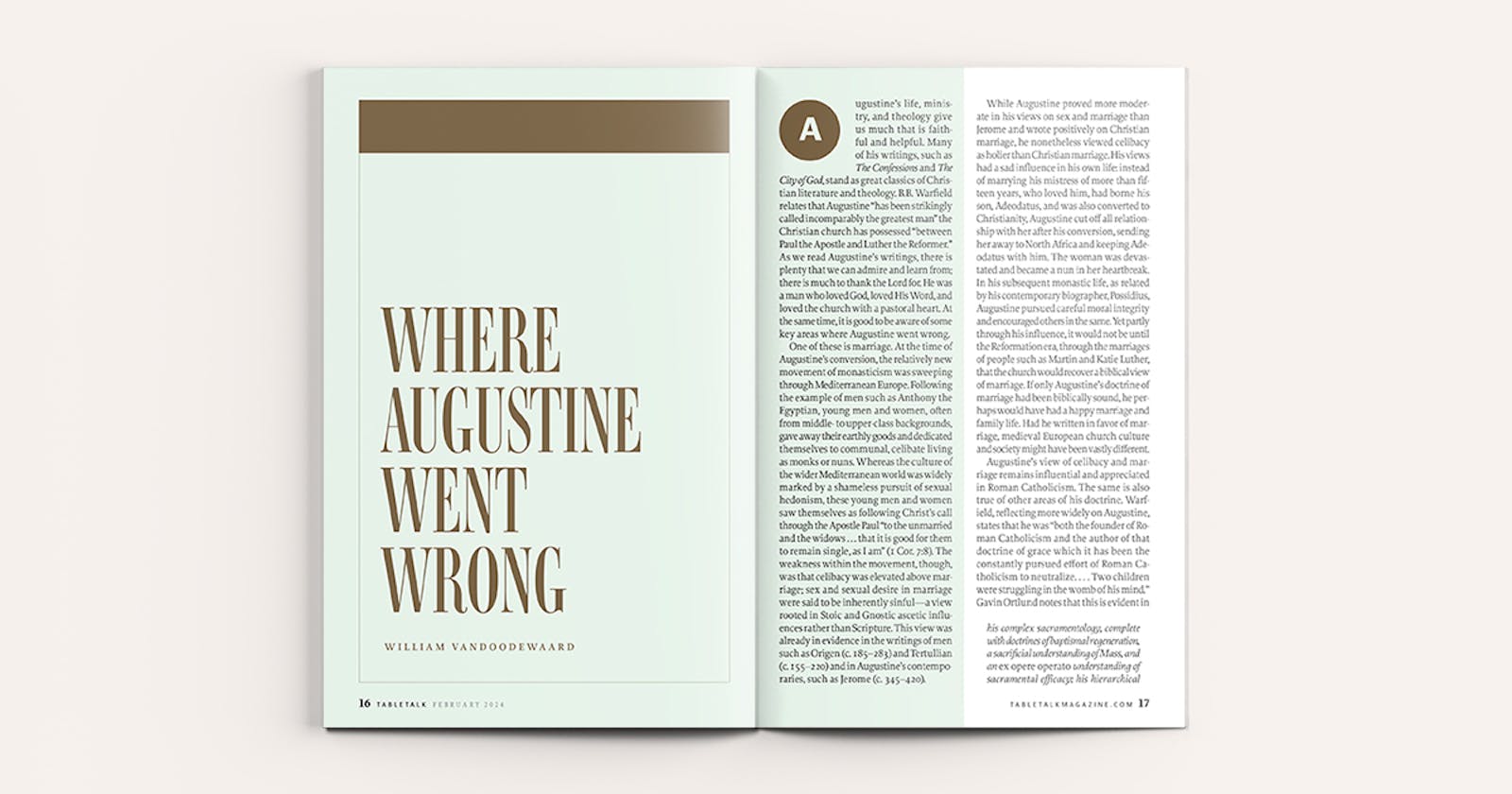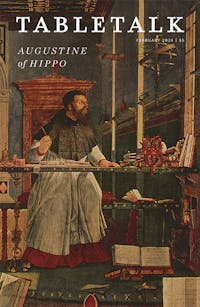
Request your free, three-month trial to Tabletalk magazine. You’ll receive the print issue monthly and gain immediate digital access to decades of archives. This trial is risk-free. No credit card required.
Try Tabletalk NowAlready receive Tabletalk magazine every month?
Verify your email address to gain unlimited access.
Augustine’s life, ministry, and theology give us much that is faithful and helpful. Many of his writings, such as The Confessions and The City of God, stand as great classics of Christian literature and theology. B.B. Warfield relates that Augustine “has been strikingly called incomparably the greatest man” the Christian church has possessed “between Paul the Apostle and Luther the Reformer.” As we read Augustine’s writings, there is plenty that we can admire and learn from; there is much to thank the Lord for. He was a man who loved God, loved His Word, and loved the church with a pastoral heart. At the same time, it is good to be aware of some key areas where Augustine went wrong.
One of these is marriage. At the time of Augustine’s conversion, the relatively new movement of monasticism was sweeping through Mediterranean Europe. Following the example of men such as Anthony the Egyptian, young men and women, often from middle- to upper-class backgrounds, gave away their earthly goods and dedicated themselves to communal, celibate living as monks or nuns. Whereas the culture of the wider Mediterranean world was widely marked by a shameless pursuit of sexual hedonism, these young men and women saw themselves as following Christ’s call through the Apostle Paul “to the unmarried and the widows . . . that it is good for them to remain single, as I am” (1 Cor. 7:8). The weakness within the movement, though, was that celibacy was elevated above marriage; sex and sexual desire in marriage were said to be inherently sinful—a view rooted in Stoic and Gnostic ascetic influences rather than Scripture. This view was already in evidence in the writings of men such as Origen (c. 185–283) and Tertullian (c. 155–220) and in Augustine’s contemporaries, such as Jerome (c. 345–420).
While Augustine proved more moderate in his views on sex and marriage than Jerome and wrote positively on Christian marriage, he nonetheless viewed celibacy as holier than Christian marriage. His views had a sad influence in his own life: instead of marrying his mistress of more than fifteen years, who loved him, had borne his son, Adeodatus, and was also converted to Christianity, Augustine cut off all relationship with her after his conversion, sending her away to North Africa and keeping Adeodatus with him. The woman was devastated and became a nun in her heartbreak. In his subsequent monastic life, as related by his contemporary biographer, Possidius, Augustine pursued careful moral integrity and encouraged others in the same. Yet partly through his influence, it would not be until the Reformation era, through the marriages of people such as Martin and Katie Luther, that the church would recover a biblical view of marriage. If only Augustine’s doctrine of marriage had been biblically sound, he perhaps would have had a happy marriage and family life. Had he written in favor of marriage, medieval European church culture and society might have been vastly different.
Augustine’s view of celibacy and marriage remains influential and appreciated in Roman Catholicism. The same is also true of other areas of his doctrine. Warfield, reflecting more widely on Augustine, states that he was “both the founder of Roman Catholicism and the author of that doctrine of grace which it has been the constantly pursued effort of Roman Catholicism to neutralize. . . . Two children were struggling in the womb of his mind.” Gavin Ortlund notes that this is evident in
his complex sacramentology, complete with doctrines of baptismal regeneration, a sacrificial understanding of Mass, and an ex opere operato understanding of sacramental efficacy; his hierarchical ecclesiology, complete with a doctrine of the papacy, belief in the authority of the church . . . and his doctrines of saintly intercession, purgatory, penance, and the perpetual virginity of Mary.
His doctrines of justification and perseverance can be added to this list.
Augustine’s doctrine of the sacraments was in some respects markedly different from that of the later developed view of Roman Catholicism. Unlike later theologians, including in the Reformation and post-Reformation era, Augustine did not provide a distinct definition of what a sacrament is but spoke of sacraments as signs bearing a connection to, but having a distinction from, the things signified: visible signs of invisible grace. While aspects of his thought remain helpful and are echoed in the Westminster Confession of Faith, Augustine’s indistinct use of the term sacramentum had wide application in his writings, ranging from Old Testament signs and symbols to Scripture itself, marriage, ordination, and of course baptism and the Lord’s Supper. In his application of the term, Augustine does not fit neatly within either the Roman Catholic system of seven sacraments or the Reformation recovery of the biblical understanding of the two sacraments of baptism and the Lord’s Supper. It is likely that he would have held that marriage, ordination, baptism, and the Lord’s Supper are sacraments according to later definitions of the term, though he viewed baptism and the Lord’s Supper as primary. It is undoubtedly the case that his and other patristic writers’ loose use of the term sacramentum did much to contribute to the multiplication of “sacraments” in the late patristic and medieval eras.
Augustine’s understanding of how the sacraments of baptism and the Lord’s Supper function was also problematic. Instead of seeing baptism as a sign and seal of the promises of the gospel in Christ, made effectual to the elect through the regenerating work of the Holy Spirit by the Word, Augustine held that in baptism, Christ works through the minister performing the sacrament so that every recipient of baptism both is regenerated by the Holy Spirit and receives forgiveness of sins. Baptism here functions in a way that prefigures the later Roman Catholic doctrine of ex opere operato: when baptism is carried out by a minister of the church, the grace of Christ always passes through to the recipient. This, of course, raises a question: What about those who prove to have been hypocrites or who apostatize at some point after baptism? Augustine’s answer was that regeneration and forgiveness through baptism do not necessarily coincide with eternal election unto salvation—someone could be born into the kingdom of grace only to perish eternally. Only those predestined unto salvation would be enabled to continue in a persevering faith and love through the additional gift of preserving grace.

Connected with this is Augustine’s understanding of justification. While the elect are justified by faith, Augustine teaches that this justification takes place through sanctification and perseverance. Justification and sanctification are blurred together. While he continues to exalt the sovereignty of God in salvation through Christ and presses the baptized members of the church to live in repentance, faith, and love to Christ, Augustine’s doctrine of baptism—along with his teaching on regeneration, justification, and perseverance—has much in common with later Roman Catholic doctrine.
The same is true in aspects of his doctrine of the Lord’s Supper. Augustine viewed the Lord’s Supper as signifying many things: the unity of the church as the body of Christ, in union with Christ; the bread and wine as spiritual food; and the self-sacrifice of Christ. Much of his thought here reflects rich biblical truths. Though at points emphasizing that the substance of the bread and wine remain unchanged in the Lord’s Supper, Augustine also occasionally spoke in language that prefigured the later Roman Catholic doctrine of transubstantiation: “what you can see here . . . is bread and wine; but when the Word is applied to it, [it] becomes the body and blood of the Word.” As with baptism, Augustine saw the Lord’s Supper, when administered by a minister of the church, as a conduit of the grace of Christ in a way that prefigured later ex opere operato teaching. At the same time, he rightly emphasized both the necessity of reception in faith and the dangers of unworthy participation.
In his doctrine of the church, Augustine followed Cyprian in holding to the necessity of the visible unity of the institutional church in the context of the Donatist schism. For Augustine, this necessity of visible unity was also connected with the efficacy, though not the validity, of the sacraments. Committed to an episcopal governance of the church, Augustine believed that individual bishops should hold significant personal authority over the local congregation. He also viewed the bishop of Rome as primary in relation to other bishops in the Western realm of the universal church. Yet there is good indication that these views were tempered in his thought and practice. Augustine held to the importance of both presbyters and bishops in mutual accountability through local councils, and allowed for the possibility of having co-bishops with a parity of authority leading a local church, as in his own ministry alongside the bishop Valerius in Hippo. Augustine also saw limits on the primacy of the bishop of Rome: he did not hesitate to disagree with and rebuke Pope Zosimus when he saw Zosimus as deviating from scriptural doctrine or practice.
Not long before his death in a besieged Hippo, Augustine set out to reflect on and correct his errors, recording them in a volume titled Retractions. His writings reflected his desire to submit in all things to the authority of Scripture. While he would be glad for the commendation of all that was good, he would certainly expect us to do the same, giving thanks for the right and noting and avoiding the wrong.
